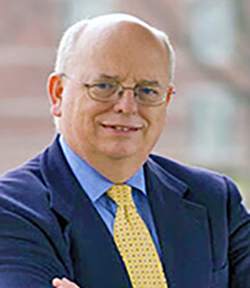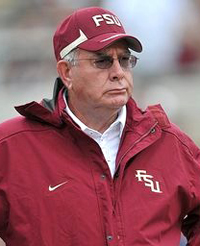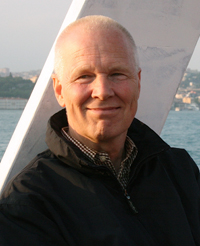
What do a former member of the Federal Reserve System’s Board of Governors; a beloved university professor, administrator and mentor; and the creator of the legendary Osceola and Renegade football tradition have in common? All are among an esteemed group of individuals who will be honored this weekend at the Florida State University Alumni Association’s Homecoming Awards Breakfast.
The breakfast will be held on the day of the Homecoming football game — Saturday, Oct. 31 — in the Oglesby Union Ballrooms, located on Florida State’s main campus. Breakfast will begin at 8 a.m., and the awards program will commence at 8:30. Tickets ($10 per person) are required and can be purchased online by Thursday, Oct. 29, or at the door on the day of the event. To find out more, visit the Alumni Association Web site at this link or contact Joe Mahshie of the Alumni Association at (850) 644-3035 or jmahshie@admin.fsu.edu.
Alumni Association President Scott Atwell said the traditional awards breakfast “gives Florida State alumni a golden opportunity to reconnect with old friends, celebrate the successes of their fellow alumni and others who have brought honor to the university, and show their appreciation for the institution that means so much to all of us.” This year’s gathering kicks off a busy Homecoming day that culminates with a noon gridiron match-up at Doak Campbell Stadium against the North Carolina State University Wolfpack.
Immediately following the awards breakfast, the Florida State Circle of Omicron Delta Kappa (ODK) National Leadership Honor Society will conduct a brief initiation ceremony, which will be held in rooms 312 and 313 of Oglesby Union. The ceremony, a Homecoming tradition, is free of charge; all current, alumni and faculty ODK initiates are invited to attend. For more information about the Oct. 31 initiation, contact ODK President Chelsea Ziembko at (850) 516-7731 or cmz06@fsu.edu or e-mail ODK adviser Adrienne Frame at aframe@admin.fsu.edu.
As always, the Homecoming Awards Breakfast will formally recognize and celebrate the distinguished Bernard F. Sliger Award winner, the Homecoming Parade Grand Marshals and the Homecoming Parade Faculty Grand Marshal, all chosen by the Alumni Association; the newest group of “Grads Made Good,” selected by the Florida State Circle of ODK; and the Ross Oglesby Award recipient, selected by Garnet and Gold Key, a student-run leadership honor society, from among nominated faculty or staff with 10 or more years of exemplary service to students and the university.
In addition, this year’s awards breakfast will feature the presentation of the distinguished Westcott Medal. The award, named after James D. Westcott Jr., one of Florida State’s original benefactors, is a rare honor reserved for those whose loyalty, advocacy and support of the university is deemed extraordinary.
While the identities of the Ross Oglesby Award and Westcott Medal recipients always are kept secret (even from the recipients) until they are announced, the names of the other Homecoming honorees are disclosed in advance. For 2008, they are:
Grads Made Good, chosen by FSU’s Circle of ODK National Leadership Honor Society
Grads Made Good are Florida State University alumni who have achieved outstanding success in their fields. This year, three such alumni have been chosen:

- Carol J. Cooper: In 27 years serving with the U.S. Navy’s Judge Advocate General Corps, Cooper (B.S. ’73, M.S. ’76, Accounting; J.D. ’77) held a number of positions, both stateside and overseas. The one constant, however, was the skillful way she performed her duties. Over the course of her Navy career she received two Navy Achievement Medals, two Navy Commendation Medals and two Meritorious Service Medals. What’s more, she received three Legion of Merit Medals — the second-highest non-combat award that can be earned. Among her other accomplishments, Cooper was the first female Navy judge advocate to be appointed to the Appellate Court of the Navy-Marine Corps Court of Criminal Appeals. Later, she became the first woman to be appointed Director of Appellate Defense for the Navy, where she supervised 13 other active-duty appellate attorneys and another 20 reserve attorneys. To cap her military career, Cooper became the senior counsel for the surgeon general of the Navy. Cooper, who retired from military service in 2005, now is the deputy general counsel for TRICARE Management Activity, which develops the policy and implements programs for the nation’s military health care system.

- Manuel H. Johnson: In the 1980s, Johnson (M.S. ’75, Ph.D. ’77, Economics) was one of the most influential policy figures in world economic affairs. President Reagan appointed him in 1986 to serve on the Federal Reserve System’s Board of Governors. Johnson subsequently was appointed vice chairman under Chairman Alan Greenspan. As vice chairman, he coordinated monetary policy with the central banks of Europe and Japan. During Johnson’s tenure at the Federal Reserve, the nation enjoyed one of its most stable economic periods since World War II, with one exception: the stock market crash of October 1987. In the aftermath, Johnson played a key role in preventing systemic economic damage and in the coordination of international monetary policy by the Group of Ten major industrial countries. Prior to his tenure with the Fed, Johnson served as both deputy assistant secretary and assistant secretary of the U.S. Treasury, from 1981 to 1986. Today, he is the co-chairman and senior partner at Johnson Smick International, which provides information services on economic and political policy changes in major countries that affect global financial institutions.

- Barry V. Qualls: Qualls (B.A. ’67, English) is as synonymous with Rutgers University as the school’s nickname, the Scarlet Knights. For 38 years, he has been a veritable force on that campus for undergraduate education. Beyond teaching, he has mentored generations of students and colleagues, and has overseen the most significant reorganization of undergraduate education in Rutgers’ history. Beginning in the classrooms of the Rutgers English department in 1971, Qualls’ career was founded on his love of teaching Victorian literature. His first administrative foray was as the associate director and then director of graduate studies in English, followed by service as chairman of the English department. In 1997, he became dean of humanities in Rutgers’ Faculty of Arts and Sciences. Since 2006, Qualls has been Rutgers’ vice president of undergraduate education. Over nearly four decades, Qualls has received every teaching award the university has to give, most notably its Warren I. Susman Award for Excellence in Teaching, in 1985. The award is Rutgers’ highest honor for outstanding and innovative performance in the classroom by a tenured faculty member.
Bill Durham, the Alumni Association’s Bernard F. Sliger Award winner
Named for Florida State’s 10th president, the Bernard F. Sliger Award recognizes a member of the university community who has made a major contribution toward the fulfillment of its mission. This year the award will go to Durham, a Tallahassee businessman and FSU alumnus best known as the creator and longtime guiding force behind one of the most spectacular traditions in all of college football — the horse-and-rider tandem of Renegade and Osceola.

As a student at Florida State, Durham first suggested that the Seminoles have a horse and rider on the field for football games while serving on the Homecoming Committee in 1962. The idea was quickly dismissed, but Durham didn’t give up. After graduating in 1965, he went on to a successful business career in Tallahassee — but never completely gave up his vision of starting a new tradition at his alma mater that would generate unprecedented levels of excitement among the Florida State faithful.
Durham’s vision went nowhere until 1977, when the football team’s new head coach, Bobby Bowden, heard of his idea. Durham met with the coach and his wife, Ann, one night and suggested the horse and Indian warrior as a way to raise school spirit. The Bowdens had been considering a similar idea, and plans to establish the new tradition began in earnest.
Durham sought and obtained the approval of the Seminole Tribe of Florida for the portrayal of Osceola, and the legend officially began at the opening game of the 1978 football season against Oklahoma State. Since that time, Osceola, in authentic regalia designed by the women of the Seminole Tribe of Florida, and Renegade, a regal Appaloosa horse, have opened every home game with the traditional planting of a flaming spear, have appeared in numerous major bowl games, and have performed on national television on countless occasions.
Durham retired from his Renegade duties after the 2002 football season and passed the torch to his son, Allen, himself a former Osceola.
Mickey and Diane Andrews, the Alumni Association’s 2009 Homecoming Parade Grand Marshals
With the exception of Bobby Bowden, perhaps no one is more responsible for the Seminoles’ rise to national prominence on the football field than Mickey Andrews, the team’s longtime defensive coordinator and associate head coach, now in his 26th season at Florida State.

The longest-tenured and most successful assistant coach in the Atlantic Coast Conference, Andrews’ on-the-field successes are legion. His dominating defenses played critical roles in Florida State’s national-championship seasons of 1993 and 1999, and he has coached nearly 80 players who have gone on to play in the NFL, including 18 first-round draft picks. Andrews was named the nation’s top assistant coach in 2000 by the All-American Football Foundation, the national defensive coordinator of the year in 1998 by the American Football Coach’s Magazine, and the national assistant coach of the year by Athlon’s Magazine in 1991.
As hardnosed as Andrews is on the football field, his wife, Diane, is just as congenial and approachable off of it. A doting mother and grandmother, she also is a tireless cheerleader for her husband and her Seminoles. Together, Mickey and Diane Andrews are two of Florida State’s most welcoming ambassadors.
Bill Moeller, the Alumni Association’s 2009 Homecoming Parade Faculty Grand Marshal
The Parade Faculty Grand Marshal title honors someone who has shown exceptional commitment, leadership and service to The Florida State University. This year, that honor goes to Moeller, co-director of Florida State’s Center for Leadership and Civic Education.

A 28-year employee of Florida State, Moeller has long specialized in providing university resources to the community. Such is the case with the Center for Leadership and Civic Education, a campus-wide endeavor created to develop responsible citizens and effective leaders among the university’s 40,000-plus students. Moeller has helped direct the center since it opened in 1994 as the Center for Civic Education and Service. He also has provided leadership to build community partnerships between The Florida State University and numerous governmental agencies, schools and nonprofit organizations.
Visit this link to learn more about events slated for Oct. 25-31 during Homecoming 2009: “Ignited by Tradition.”




